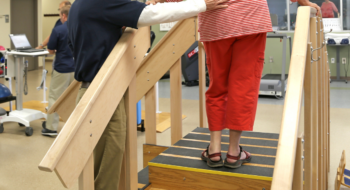For many people, increased pain and stiffness is an inescapable part of aging, particularly in joints such as the hips and knees. Everyday movements can become more challenging and affect quality of life.
While these symptoms are sometimes simply part of getting older, they might also indicate an underlying medical condition.
One common cause of joint pain is arthritis, which is the swelling or inflammation of the joint. Arthritis can be diagnosed at any age, but the condition is most common in people over the age of 50 and typically worsens with age.
While there are a variety of ways to reduce arthritis-related pain, some patients eventually turn to joint replacement surgery for long-term relief.
Dr. Christian Eccles, a fellowship-trained and board-certified orthopedic surgeon at Tidelands Health Orthopedics at Georgetown, specializes in hip and knee replacement surgeries and says there are several ways to help determine if the approach may be right for you.
1. Daily activities are a challenge
When joint pain begins to interfere with routine activities, it’s time to take notice.
“The bones can start to grind against each other, causing significant pain and impacting quality of life,” says Dr. Eccles.
Tasks like walking, climbing stairs or even getting out of a chair can become painful.
2. There is arthritis in the joint
An evaluation, including a physical exam and X-ray, can help determine if arthritis is to blame for your joint pain.
“One of the main symptoms of hip arthritis is groin pain,” says Dr. Eccles. “The hip is close to the front of the body, so a lot of hip pain actually presents in the groin. As a result, many patients will think they have a groin pull or strain when they have arthritis.”
3. More conservative approaches aren’t helping
If more conservative approaches to managing your pain, such as physical therapy, anti-inflammatory medication, modifying activity or corticosteroids injections, aren’t effective, it may be time to consider replacement surgery.
“When those measures don’t work and you’re miserable, then surgery might be the answer,” says Dr. Eccles.
4. You are prepared to commit to recovery
Joint replacement surgery requires a commitment to recovery for the best outcomes.
Recovery time varies depending on the individual and the type of surgery, but most patients will see an improvement in pain and motion within a few weeks.
“With the advanced approaches and technology we use at Tidelands Health, your new joints should last 25 years or more,” says Dr. Eccles.
If your quality of life has diminished because of your joint pain, consider scheduling an appointment with your physician or a qualified care provider to discuss treatment options.






